A POLICY & PLAN FRAMEWORK FOR NATURAL SURFACE TRAILS IN THE CITY OF ASHEVILLE, NORTH CAROLINA
Our Latest AVL Unpaved Update: July 30, 2025
AVL Unpaved Moves Forward: We have a win to celebrate!
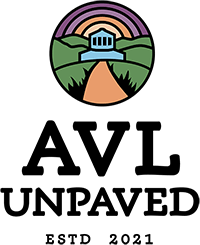
On Tuesday, July 29, Asheville City Council unanimously voted to support the AVL Unpaved initiative—an exciting milestone that clears the path for two new natural surface trails in our city.
This vote authorizes the City Manager to enter into an agreement that empowers the AVL Unpaved Alliance—a partnership between Pisgah Area SORBA, Connect Buncombe, and Asheville on Bikes—to begin building and maintaining these trails.
This is a win for trails, for riders, and for everyone who believes in expanding access to the outdoors.
But the work doesn’t stop here.
Now, we need your support to build what’s been approved.
Your donation today helps the AVL Unpaved Alliance bring these trails to life and manage the construction phase. Every dollar counts as we work to expand trail access in Asheville for mountain bikers, runners, hikers, families, and future generations.
Together, we’re building the trails Asheville deserves.
About the Trails
West Asheville Trail
These trails will sit beside the French Broad River West Greenway, and will be accessible by sidewalk, bike lanes, greenways, and transit.

East Asheville Trail
This trail will expand the network around Azalea Park and eventually link to the future Swannanoa Greenway and the Hellbender Regional Trail, strengthening our region’s growing system of active transportation.

Progress like this doesn’t happen overnight—and it doesn’t happen alone. We’re proud of the work it took to get here, and we’re grateful for the city staff, community advocates, and local leaders who stood behind this effort.
Our region still faces challenges, but steady, meaningful wins like this one move us forward. Let’s take a moment to celebrate this progress.
How can I support AVL Unpaved?

As our community transitions into the recovery phase following Hurricane Helene, we have a unique opportunity to not only rebuild but also reshape our transportation and trail systems. Your donations will provide AoB with the resources needed to advance complete streets, expand multi-use trails, and develop the AVL Unpaved natural surface trail system.
Additionally, if you or your organization would like to support AVL Unpaved, consider making a tax-deductible donation. Every contribution brings us closer to a more resilient and connected community.
What are the AVL Unpaved Trails?
Asheville Unpaved is a plan to build natural surface multi-use trails within the City of Asheville on underused and undevelopable tracks of land. The goal is to increase each person’s access to trails and green spaces, without the use of a car. There is overwhelming research that reports the health benefits of proximity into greenspaces from the build environment:
- Growing Equity in City Green Space
- Better Forests Better Cities
- Lack of green spaces in under-represented communities is a health crisis that can’t wait
The AVL Unpaved Alliance (Alliance) is a group of nonprofits, made up of AoB, Pisgah Area Southern Off Road Organization (PASORBA) and Connect Buncombe, that formed in 2021 in order to promote this work. In partnership with the City of Asheville, the Alliance hired Elevated Trail Designs to design a proposal for a phase 1 series of natural surface trails in the undeveloped forested pockets of Asheville. Following Elevated Trail Design’s proposed system, the Alliance and City of Asheville presented the trail concepts to the Asheville community through a variety of public engagement events.
In 2022, thanks to generous community support and grant funding through Explore Asheville, initial projects were identified: French Broad River West and Azalea Park.
Explore the project maps:


AVL Unpaved Alliance is dedicated to building pilot natural surface trail systems to support better connections into the City’s natural environments for Asheville-area residents and its visitors. Users will be able to access this unpaved trail system via greenway, sidewalks, bike lanes, transit stops, and trailheads. These trails provide “front door” access to natural surface trails and will support a variety of uses, including, but not limited to: walking, running, biking with kids, resting in the forest, hiking, recumbent bike riding, exercise for someone with a prosthetic limb, cargo biking, bird watching, middle school students learning bike skills, walking the dog, bird watching, and biking with friends.
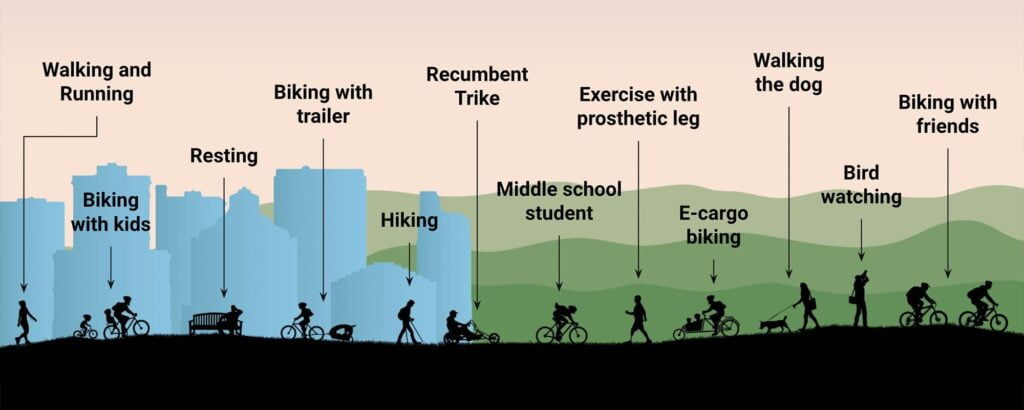
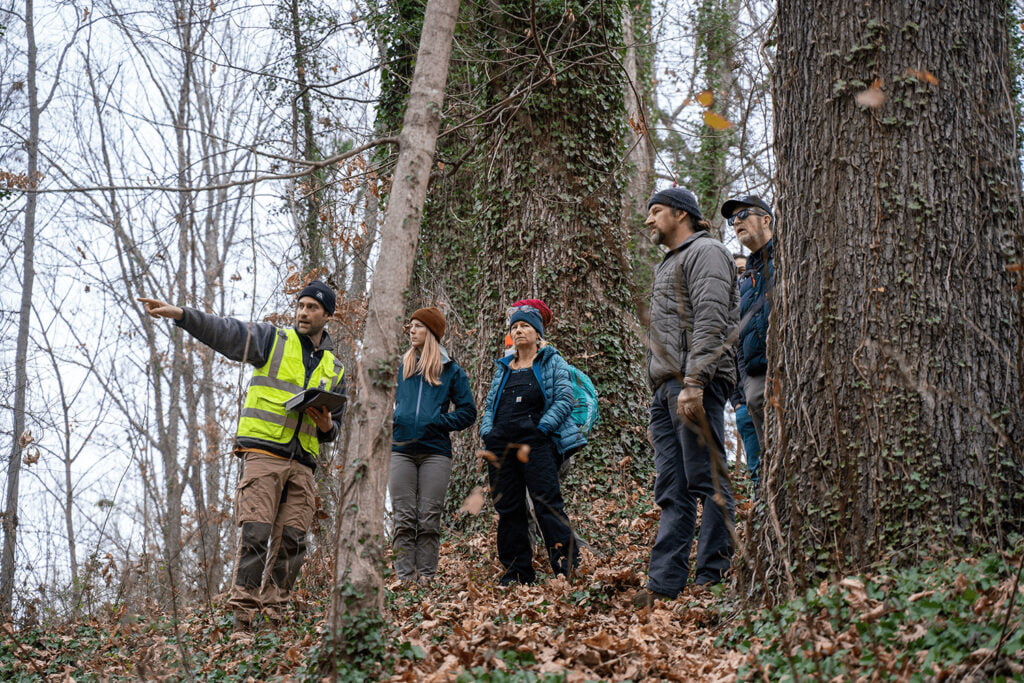
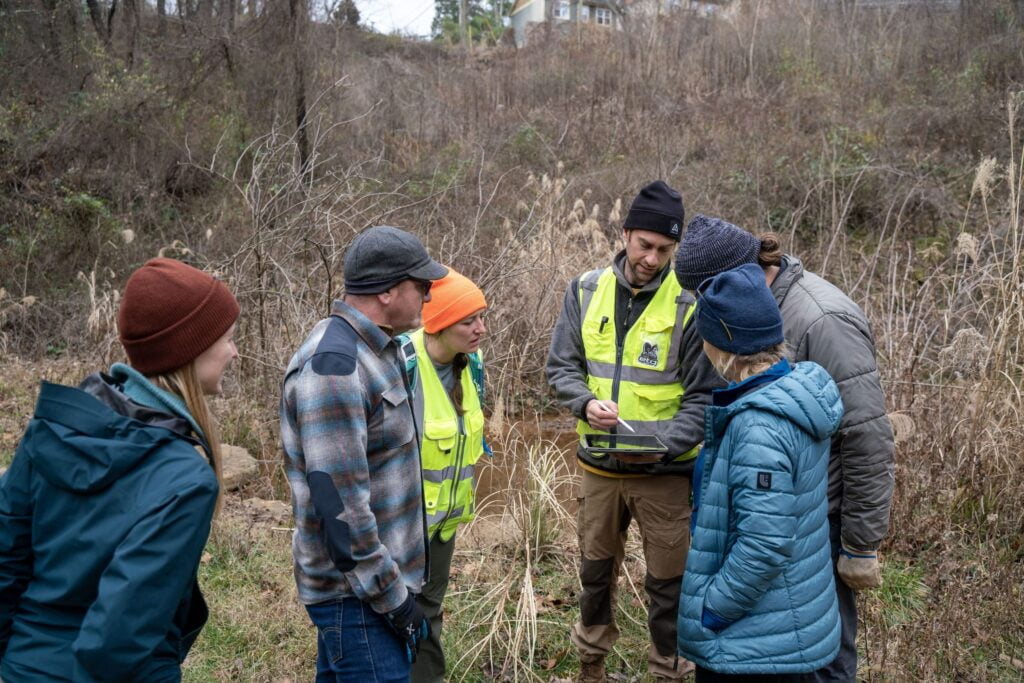
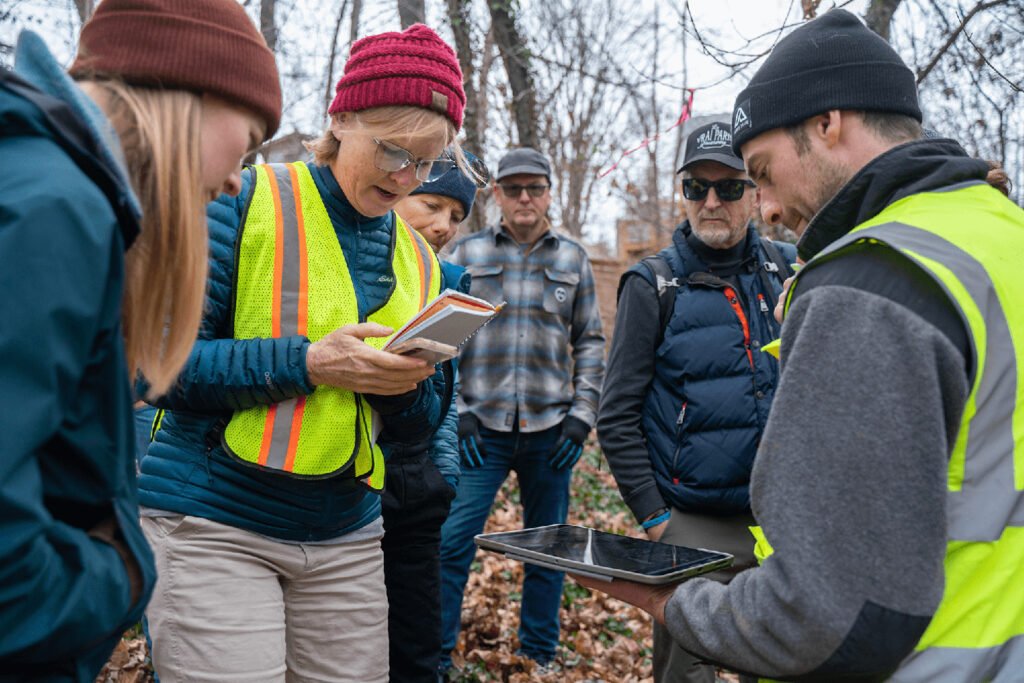
What is the history of the project?
In 2021, the three non-profit partners met informally to consider how they might support advancing city trails. In October of 2023, City Council unanimously adopted the Close the Gap Plan which identifies natural surface trails as a strategy to improve Asheville’s active transportation network. Complete streets, transit, and existing vehicular City parking will all support access to these trails. We call this the “reducing your distance to dirt,” approach.
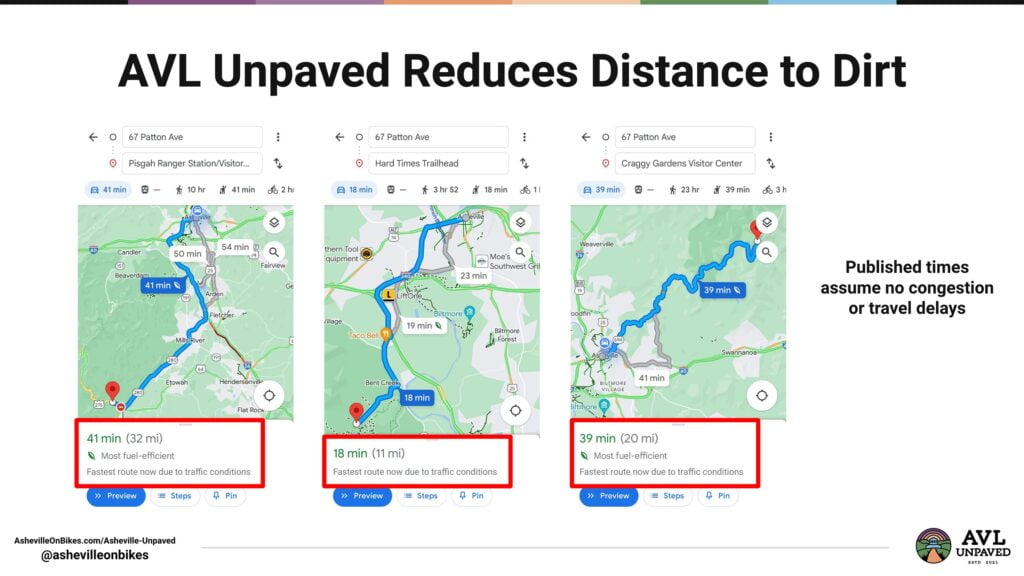
Many Asheville residents drive to Bent Creek in the Pisgah National forest to hike, run, ride bikes, or splash in the creek. This “drive to hike/ride” pattern is bad for the environment, prevents low income residents from accessing trails, decreases the overall number of people who might otherwise exercise, and is resulting in overcrowding at many trailheads. Asheville Unpaved solves those problems and makes trails accessible within the City, from the door of your house, without a car.
Answers to Common Questions about this project
What benefits are provided by Asheville Unpaved?
Asheville Unpaved will provide residents and visitors with the following benefits:
- Front door trail access: No longer will residents and visitors have to drive 30 minutes to an hour to visit world-class trails. Instead, users will be able to go from their front door to the trail without a vehicle.
- Equitable access: Trails will be developed in Asheville’s natural lands and parks, campuses, and urban areas, and spread equitably across the city. Trails that connect directly from existing transit stops, sidewalks, greenways, and existing bike facilities are prioritized.
- More trail miles for fewer dollars: Natural surface trails can be one of the cheapest public investments for the greatest returns. Trails are 35 times cheaper to build than greenways. They can serve as precursors to greenways being built, or utilize lands where greenways would be too costly to build.
- Minimal climate footprint: Natural surface trails can connect neighborhoods, greenways, and urban centers without creating the climate footprint associated with paved trails.
- Sustainably designed and built: Asheville Unpaved’s trails will be sustainably designed and built for minimal environmental impact and maximum use.
- Improved health and wellness: Trails can play a critical role in physical and mental health.
- Increased sense of community and equity: Asheville Unpaved will be community-supported. With this comes collaboration, community service, and socialization. This system will provide opportunities for chance encounters, new friendships, and programmed activities. Users of these trails will include community members who have little access to the popular trail opportunities on the outskirts of Asheville, including urban school children who don’t have trail access, those with disabilities that are given adaptive equipment to ride trails, and neighborhoods that are currently unsafe for walking. Asheville Unpaved will prioritize opportunities that provide the greatest benefit for equity, including opportunities to partner with neighborhoods that lack basic walking and biking infrastructure.
- Positive economic impact: Trails are proven to have a huge return on investment (ROI) seeing huge economic returns per the low cost of infrastructure, spurred business growth, and health savings cost. Two case studies of Southern communities that have seen a tremendous ROI from trails can be read about in National Context further below.
Why is Asheville Unpaved Needed Now?
Asheville Unpaved is needed now because we should not keep building infrastructure that causes people to rely primarily on a car, that reserves our best outdoor experiences for our most privileged residents, and that makes it difficult to live a long life at full health within our City.
Western NC is a haven of outdoor activity and benefits from a large outdoor recreation industry. Statewide, outdoor recreation generates 14.6 billion in annual value for NC and accounts for 146,000 jobs. This trail system will help to grow that portion of our economy while also providing a direct local benefit to our residents. The AVL Unpaved system allows people to connect to the trail system via neighborhood streets. We call this improved access “front door access” and a “decreased distance to dirt.”
One of the lessons learned during the COVID-19 pandemic is that we are healthier when we have easy access to trails for exercise. As trail use spiked and visitors sought out Asheville as a safe haven during the pandemic, it highlighted the lack of trails in the City and also the many benefits of living in the mountains. The need for more trails in the Asheville area was made more apparent than before.
What City of Asheville Resources Describe This Project?
- https://www.ashevillenc.gov/projects/avl-unpaved
- https://storymaps.arcgis.com/stories/3a4557ac89e84fa792a6c02a01316613
What news stories have been published about this project?
- Dec 14, 2017, City of Asheville, “Asheville’s Greenway Warmer was a hot event“
- April 8, 2021, Ashvegas, “Asheville Unpaved initiative aims to create inner-city system of natural surface biking trails“
- May 23, 2022, Citizen Times, “See Asheville’s top 10 priority greenway projects, plan to fix ‘oatmeal cookie sidewalks’“
- July 22, 2022, ABC13, “Groups want to build network of natural surface trails in Asheville“
- Oct 25, 2022, City of Asheville, “City Adopts the Close the GAP plan“
- Oct 26, 2022, Citizen Times, “Muni Golf Course, city, county big winners in TDA funding grants”
- Jan 3, 2024, Citizen Times, “Answer Man: Unpaved trails to connect Asheville neighborhoods? When are they coming?“
- Apr 30, 2024, AARP Western NC, “Community Conversation: What is Asheville Unpaved?“
Who is involved in the Asheville Unpaved Alliance?
Asheville Unpaved is a partnership led by Asheville on Bikes, Pisgah Area SORBA, and Connect Buncombe. This alliance has funded the AVL Unpaved’s phase I alignments and initial planning for the project. Future alliance partners are critical to AVL Unpaved’s success. This project requires work for trail planning, funding, design, construction, stewardship, and activation of use.
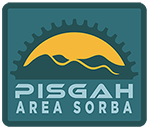
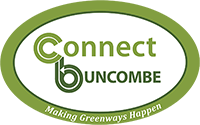
Who pays for these trails?
- The 3 trail alignments in Phase 1 are fully paid for by the community, thanks to support from individual donors and the Buncombe County TDA community grant program.
- The initial planning and design work has been paid for by the Alliance partners, who are Asheville on Bikes, Pisgah Area SORBA.
- The phase 1 trail construction plan is fully funded through individual donations and a TDA grant awarded on Jan 9, 2023.
Goals of the Asheville Unpaved Alliance
The Asheville Unpaved Alliance envisions the following goals for Asheville Unpaved:
- Trails serve as well-utilized transportation and recreation facilities. Trails serve the need of connecting neighborhoods, utilizing public space, and providing immediate access to quality trail experiences without the need of an automobile.
- Trails are built for sustainability. Trails built with proven construction techniques make them last longer with less maintenance. These same techniques make them more accessible to a broader population of people of varying abilities.
- Projects are equitable and meet the greatest need. Priority projects will benefit the greatest number of people and those most in need of trail access. The city-led public process will engage the public on trail projects on underutilized city-owned properties. Neighborhood groups or private landowners can work with the Asheville Unpaved Alliance to achieve shorter neighborhood trail connections.
Phase I: Proposed Projects
Phase 1 planning funders include the following Asheville-area non-profits: Connect Buncombe, Pisgah Area SORBA, and Asheville on Bikes. It also includes the
The following two connectivity maps show the phase one alignments and how they connect to each other via existing road networks and future planned greenways:
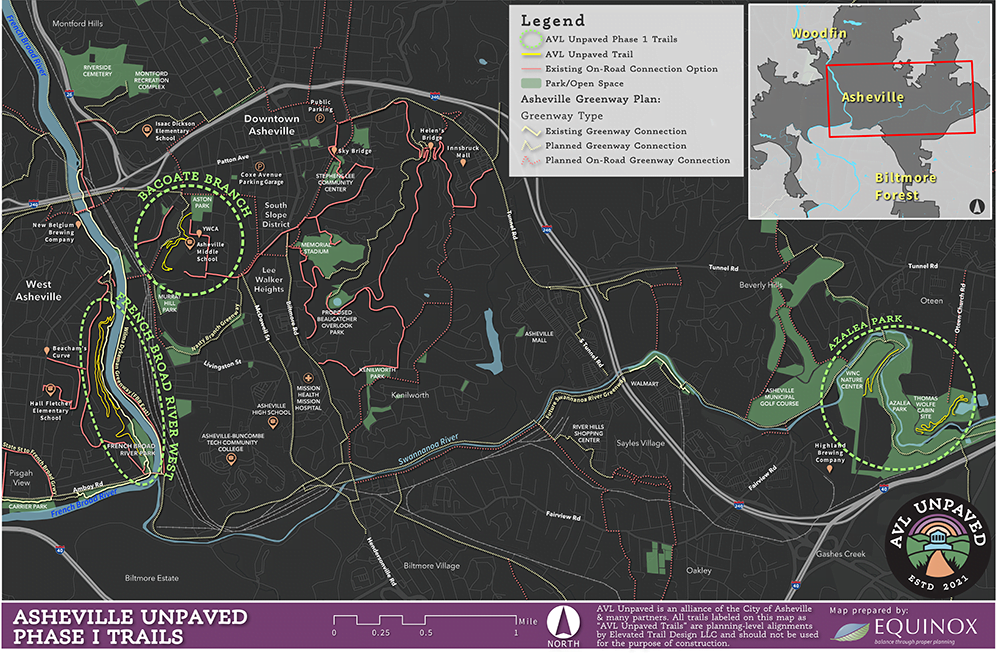
Trail Classes
Trail Hubs and Neighborhood Connectors are two classes of trail development that vary in purpose and method for implementation. The following is a description of these classes, their purpose, and characteristics:
TRAIL HUBS
- Purpose: To utilize public space for greater trail and recreation access on public lands. Hub trails can maximize use of space with “stacked” trail loops and can connect multiple destinations. The trail is designed to be the destination, may be more indirect, or have routes that serve as more direct transportation.
- Need: Hubs will take advantage of underutilized public space. Hubs can occur along greenway corridors either by building the trail adjacent to the planned greenway for a looped system or designing the trail to be an interim connection prior to the greenway being built.
- Partners: City, county, and/or state governments and Asheville Unpaved Task Force partners.
- Considerations: Design (level of difficulty and designing multi-use trails that reduce conflict), ADA requirements, MOUs needed, designing stacked looped systems, accessing multiple recreation destinations.
NEIGHBORHOOD CONNECTORS
- Purpose: To create neighborhood connections through private properties for quicker and more natural access. This provides an alternative route to get through neighborhoods. This may provide a shortcut, it might create a shorter connection (i.e. connecting two cul de sacs), it might just be nicer to walk in the woods than on the street.
- Need: Many neighborhoods in Asheville currently have community trails that are used to access through neighborhoods. This would allow for formalizing that access or to explore opportunities for new connectivity. The benefits would be less burden on the individual property owners via organized maintenance and freedom of liability in the chance of injury.
- Partners: Neighborhood organizations, private entities, city and/or county governments, Asheville Unpaved Task Force partners.
- Considerations: Design (level of difficulty), ADA* requirements, easements for public use, MOUs needed, funding opportunities.
The Asheville Unpaved Hubs and Neighborhood Connectors Map
The following maps indicate where hubs and neighborhood connectors are considered. Future trail projects are not limited to what is on this map, but should fall within the framework.
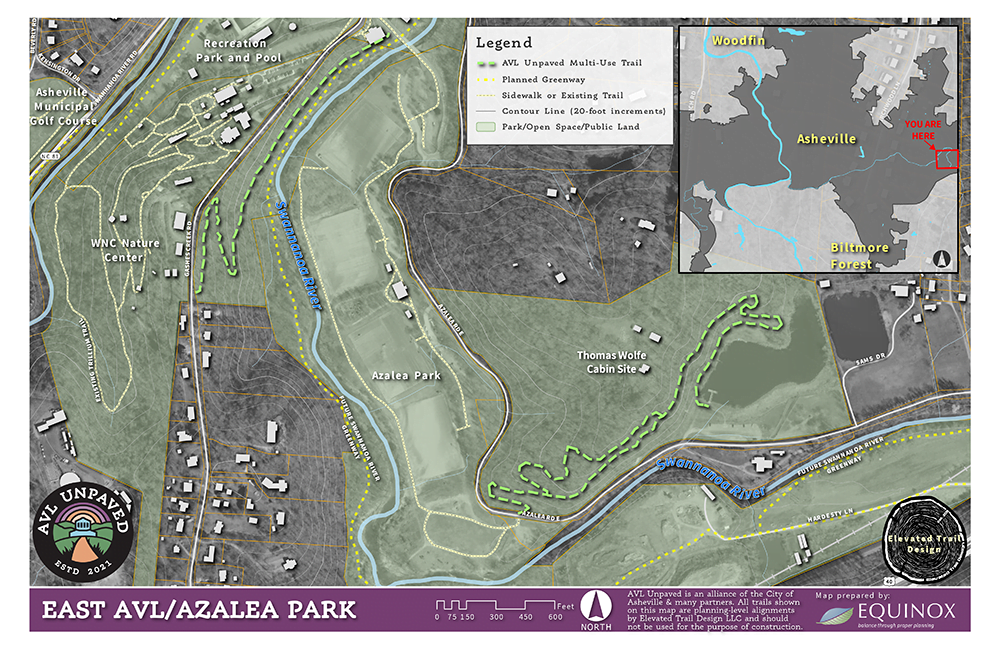
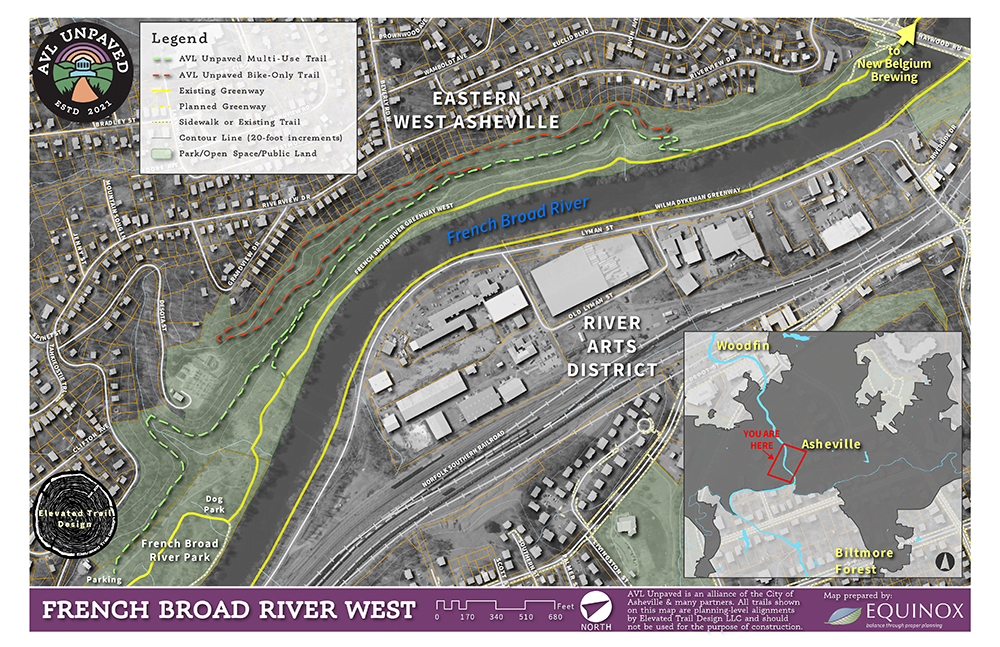
Provide Feedback
We welcome all input from members of the Asheville community. If you are an Asheville resident and you wish to provide feedback or suggestions for the Asheville Unpaved plan, please email ashevilleonbikes@gmail.com or fill out the contact form below.
Schedule a Presentation
AoB will happily participate in your upcoming meeting to present on AVL Unpaved. If you’d like for AVL Unpaved to be included in your upcoming agenda, fill out this form to schedule. We can do either in person or virtual.